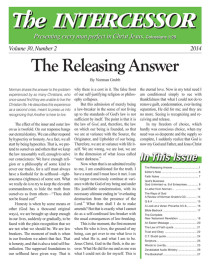
Bible Bedrock: The School of Faith
I write to you, little children, Because your sins are forgiven you for His name’s sake.
I write to you, fathers, Because you have known Him who is from the beginning.
I write to you, young men, Because you have overcome the wicked one.
I write to you, little children, Because you have known the Father.
I have written to you, fathers, Because you have known Him who is from the beginning.
I have written to you, young men, Because you are strong, and the word of God abides in you, And you have overcome the wicked one.
–1 John 2:12-14
“I write unto you, little children . I write unto you young men . I write unto you fathers.” The analogy of human birth and growth make the stages quite plain. Infancy, adolescence, adulthood. Birth, growth, maturity. The three stages of human development. And for each corresponding stage in the life in the Spirit, He gives a word of explanation. First, the little child knows his “sins are forgiven for His Name’s sake,” and “knows the Father.” These we immediately recognize as the initial evidences of the new birth. A new-born babe in Christ has manifested repentance as a confessed sinner towards God, faith towards our Lord Jesus Christ as an acknowledged Saviour, and the inner witness of the Spirit as the evidence of a saving faith. His “sins are forgiven for His Name’s sake,” and the one who was a God and Judge afar off has now become a Father known and loved in a personal sense. He “knows the Father.”
But the infant relationship is a purely dependent and external one. A babe, beautiful though it is in its time, is only on the receiving end of life. It benefits by the “acts” of its parents in nursing and clothing and feeding–that is all. It cannot manage its own affairs, still less contribute to others. Beautiful, but helpless.
Infancy is followed by adolescence. Tempestuous years. The babe must find itself and fulfill its destiny. Its body must be developed, its mind trained, its character established. It must exchange its outward dependence on its parents for inner resources of strength and knowledge, which will fit it to take its place in the world. Painful years of ferment, self-discovery and attainment.
Translate this now, with John, into the language of the Spirit. “I write unto you young men, because ye are strong, and the word of God abideth in you, and ye have overcome the wicked one.” This is something far removed from helpless infancy, depending on the outward sustenance of its parents. Babyhood reliance on a few simple and external facts of the Gospel, the milk of the Word, has been exchanged for an adequate inner experience. The bitter defeats of early Christian days, the sins of flesh and spirit,, to which he so often succumbed, the powerlessness in witness and service, have been cancelled out by the ever-present power of God.
Now it is no longer Satan the overcomer, and he the defeated; but Satan the defeated, and he the overcomer. What first came as an external word revealing an external Saviour has now become an inner word revealing an abiding Christ. The young man in Christ has evidently gone through deep waters and found rich treasure. This is the second stage.
The adolescent, though with numberless lessons to learn, is now equipped for the third stage. From being a recipient of benefits he now becomes an earner and contributor. The apprentice becomes the craftsman, the student the teacher. The young life sheltered by the home becomes the home-maker. What he once derived from others he now has within himself, an inner reservoir of acquired knowledge, now made his own. This third stage John calls fatherhood. “I write unto you, fathers.” Infancy, adolescence, adulthood. And the one comment he makes concerning the father is that he “knows Him that is from the beginning,” Not knows Him just as Father, but in all the mysteries of His being and purposes of grace, who will have all men to be saved. He knows the One from the beginning with whom John starts both his gospel and epistle, and to know this One is to be His co-worker, a member of His royal priesthood, a saviour and teacher of others, endued by the Spirit for service, even as he has been saved and sanctified by the same Spirit. In this third stage he has reached the fullest development in the counsels of the Saviour for the members of His body on earth.





